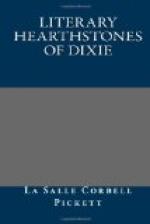As it purples in the zenith,
As it brightens
on the lawn,
There’s a hush of death
about me,
And a whisper,
“He is gone!”
On Copse Hill, “Under the Pine,” his lifelong friend stood and sorrowfully questioned:
O Tree! have not his poet-touch,
his dreams
So full of heavenly
gleams,
Wrought through the folded
dulness of thy bark,
And all thy nature
dark
Stirred to slow throbbings,
and the fluttering fire
Of faint, unknown
desire?
Near the end of his last visit he had told Paul Hayne that he did not wish to live to be old—“an octogenarian, far less a centenarian, like old Parr.” He hoped that he might stay until he was fifty or fifty-five; “one hates the idea of a mummy, intellectual or physical.” If those coveted years had been added to his thirty-eight beautiful ones, a brighter radiance might have crowned our literature. Or, would the vision have faded away with youth?
On the seventh of October, 1867, Henry Timrod was laid to rest in Trinity Churchyard, Columbia, beside his little Willie, “the Christmas gift of God” that brought such divine light to the home only to leave it in darkness when the gift was recalled before another Christmas morn had gladdened the world. The poet’s grave is marked by a shaft erected by loving hands, but a memorial more fitting to one who so loved the beautiful is found in the waving grasses and the fragrant flowers that Nature spreads for her lover, and the winds of heaven that breathe soft dirges over his lowly mound.
In Washington Square, Charleston, stands a monument erected in 1901 by the Timrod Memorial Association of South Carolina to the memory of the most vivid poet the South has given to the world. On the west panel is an inscription which expresses to us the mainspring of his character:
Through clouds and through sunshine, in peace and in war, amid the stress of poverty and the storms of civil strife, his soul never faltered and his purpose never failed. To his poetic mission he was faithful to the end. In life and in death he was “not disobedient unto the Heavenly vision.”
On the panel facing the War Monument are three stanzas from his own beautiful Ode, sung at the decoration of Confederate graves in Magnolia Cemetery in 1867—such a little time before his passing that it seems to have mournful, though unconscious, allusion to his own early fall in the heat of earth’s battle:
Sleep sweetly in your humble
graves;
Sleep, martyrs
of a fallen cause,
Though yet no marble column
craves
The pilgrim here
to pause.
In seeds of laurel in the
earth
The blossom of
your fame is blown,
And somewhere, waiting for
its birth,
The shaft is in
the stone.
Stoop, angels, hither from
the skies!
There is no holier
spot of ground
Than where defeated valor
lies,
By mourning beauty
crowned!




